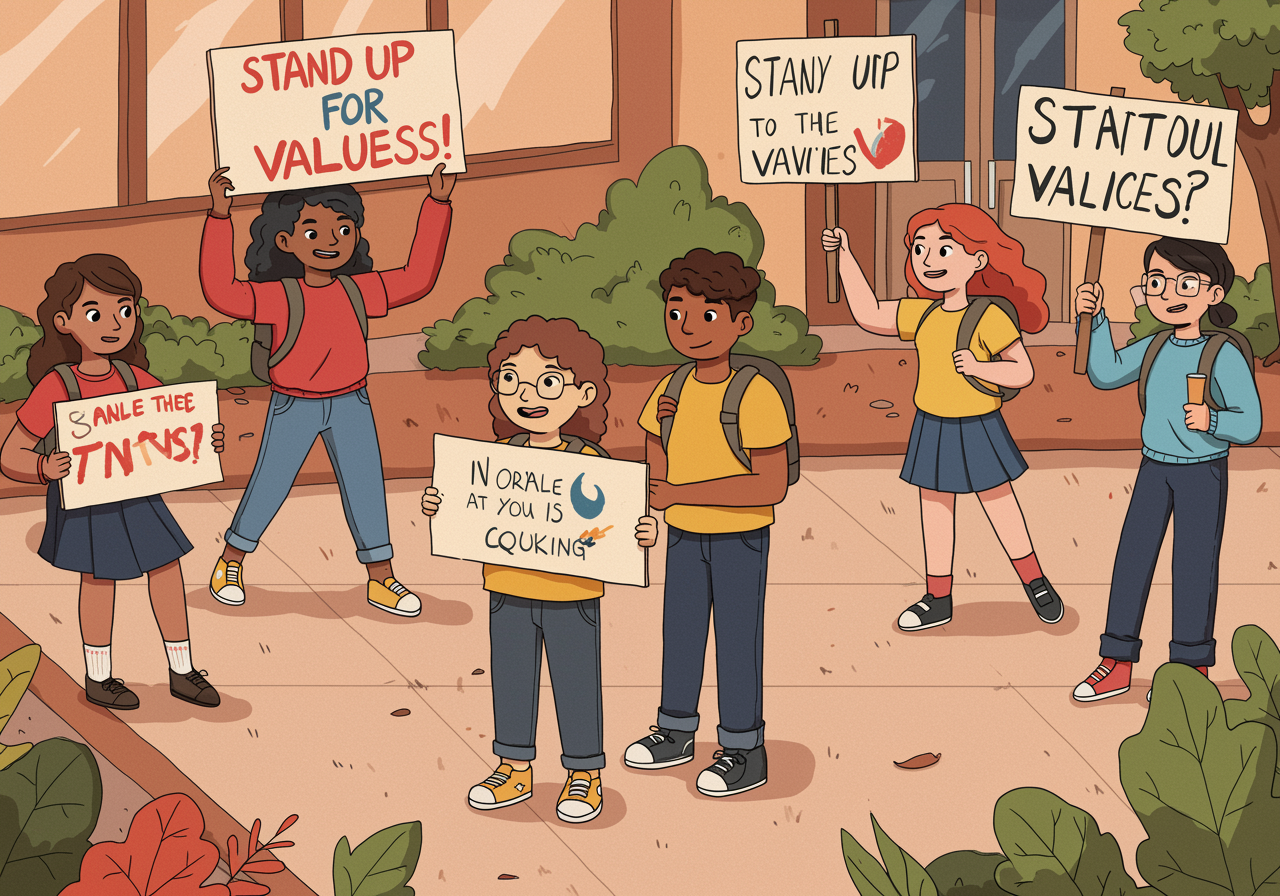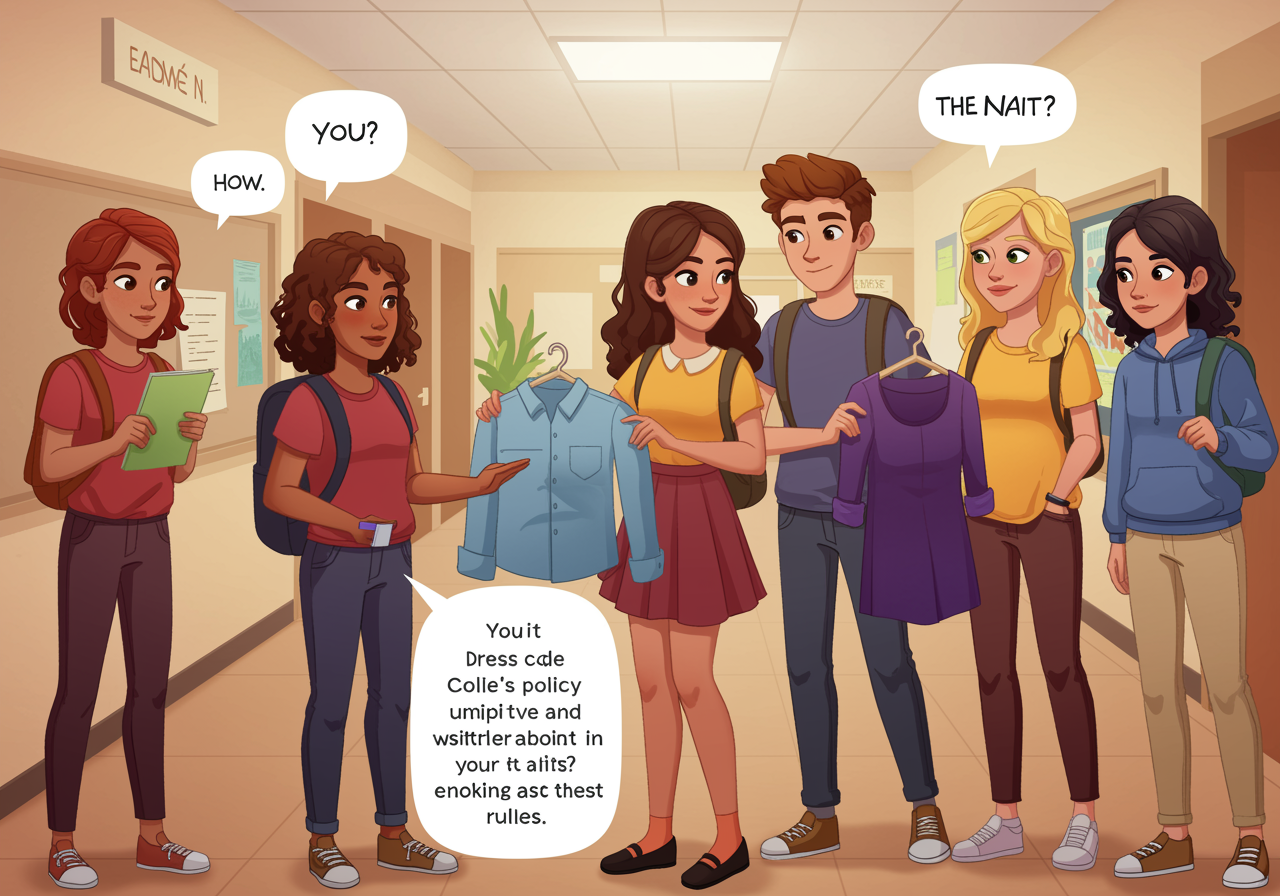Standing Up for What’s Right: When Students Become Changemakers

Discovering the difference between rebellion and standing up for your values
Explore with your teen why some students choose to challenge rules and how to tell the difference between causing trouble and fighting for what’s right.
Overview
Every day, students face moments where they have to choose between following rules and standing up for what they believe is right. Sometimes this means questioning a dress code that seems unfair, speaking up against bullying, or challenging a policy that doesn't make sense. These moments aren't about being rebellious – they're about developing moral courage and learning to think critically about the world around them. Understanding why students take stands helps families talk about values, respect, and how to create positive change.

Understand in 30 Seconds
Get up to speed quickly
- It's About Values, Not Rebellion: Students who take stands usually aren't trying to cause trouble – they're acting on deeply held beliefs about fairness and what's right.
- Rules Aren't Always Perfect: Some school rules might be outdated, unfair to certain groups, or just don't make sense anymore – and students often notice this first.
- There Are Smart Ways to Challenge: The best student activists learn to question rules respectfully, gather support, and work within systems to create change.
- It Takes Real Courage: Standing up when everyone else is following along requires bravery and the willingness to face consequences for your beliefs.
Real Life Scenario
Situations you can relate to
Imagine your school has a rule that students can't wear any hats or head coverings inside. Most students just accept it, but then you notice that some of your friends who wear religious head coverings are getting in trouble. You realize this rule might not be fair to everyone. Do you just stay quiet because 'rules are rules'? Or do you speak up because you think the rule needs to change? This is exactly the kind of situation where students have to choose between just following along and standing up for what they think is right. Think about it – some of the most important changes in history happened because people questioned rules that seemed normal but weren't actually fair to everyone.

Role Play
Spark a conversation with “what if” scenarios
What if your school banned students from discussing climate change because it was 'too political'?
- Role play: Take turns being a student who wants to start an environmental club and a principal explaining the policy. Practice having a respectful conversation about why the rule exists and why it might need to change.
What if you saw bullying happening but there was a school rule against 'tattling'?
- Role play: Role-play being a student who witnesses bullying and a teacher. Explore the difference between tattling and reporting something serious that could hurt someone.
What if your school's dress code seemed to target certain students unfairly?
- Role play: Practice being student council members discussing how to approach administrators about updating dress code policies in a way that's fair to everyone.
FAQs
Frequently asked questions people want to know
Isn't it always wrong to break school rules?
Not necessarily. Sometimes rules need to be challenged when they're unfair or harmful. The key is doing it thoughtfully and respectfully, not just to cause trouble.
How can students challenge rules without getting in serious trouble?
Students can talk to teachers, join student government, start petitions, or organize peaceful discussions. Working within the system usually works better than just breaking rules.
What's the difference between standing up for beliefs and just being defiant?
Standing up for beliefs is about fighting for something important and fair. Being defiant is usually just about not wanting to follow any rules, regardless of whether they make sense.
Examples in the Wild
See how this works day to day
- In 2018, students across the US organized walkouts to protest gun violence after the Parkland shooting, leading to new safety discussions in schools nationwide. (NPR Education News)
- Greta Thunberg started skipping school on Fridays to protest climate inaction, inspiring millions of students worldwide to join climate strikes. (BBC News)
- In 2019, students in several states successfully challenged dress codes they felt unfairly targeted girls and students of color. (Education Week)
- During the 1960s, students like Ruby Bridges and the Little Rock Nine challenged school segregation laws, helping to change education forever. (Smithsonian National Museum of African American History)
In Summary
What you should know before you start
- Students take stands when rules conflict with their values about fairness and what's right
- The best approach is respectful challenge through proper channels, not just rule-breaking
- Some rules really do need to change, and students often see problems that adults miss
- Taking a stand requires courage and the willingness to face consequences for your beliefs
Pro-tip for Parents
You got this!
If your teen wants to challenge a school rule, help them think through their reasons first. Ask questions like 'What specific problem does this rule create?' and 'How would you want to see it changed?' This helps them develop critical thinking skills and ensures they're taking a stand for the right reasons. Remember, questioning authority respectfully is actually a sign of healthy moral development.

Keep an Eye Out For
Find these examples in everyday life
- Student protests or walkouts in your community – these are great conversation starters about effective activism
- Changes to school policies that your teen mentions – ask what they think about the changes and why
- News stories about young activists – discuss what makes their approach effective or what they might do differently
Explore Beyond
Look up these related research topics
- How to be an effective advocate for change in your community
- The difference between civil disobedience and breaking the law
- How social movements throughout history have created positive change